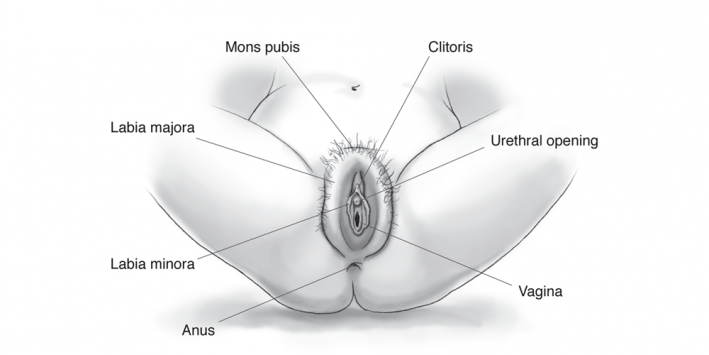Your vagina is the passage inside your body that connects your uterus (or womb) to the outside of your body. You bleed through your vagina during your period. The vagina is also the passage through which a baby is born. Your vulva is the name for the genitals on the outside of your body.
The vulva includes:
- your clitoris
- your labia majora (the larger, outer ‘lips’ to the vagina)
- your labia minora (the smaller, inner ‘lips’ to the vagina)
- your vestibule (the area around and between your urethra and vagina)
- your hymen (a thin piece of skin at the entrance to the vagina)
- a number of glands that make fluids to keep your vagina clean and moisturised.

Appearance
It can be hard to know what a normal vulva looks like if you don’t see a lot of them. But your vulva – just like your breasts – is a size, shape and colour of its own. How a vulva looks varies from woman to woman.
Some women worry that their labia (or genital ‘lips’) in particular are too long or uneven. But again, just like breasts, the length of our labia can vary and isn’t always symmetrical.
If you’re worried or you notice any changes in the appearance of you vulva, you can always talk to your doctor about it.
Discharge
Discharge or fluid from your vagina is normal. Your body makes these fluids to keep your vagina clean and moisturised. Normal vaginal discharge is usually white, cream-coloured or transparent and does not have a strong smell.
It’s also normal for the amount, colour and texture of this discharge to change throughout your menstrual cycle. It often becomes clearer and wetter in the two weeks after your period and thicker and stickier after ovulation. You may have more discharge during pregnancy, if you are on the contraceptive pill or if you are sexually aroused.
Sometimes, however, a change in discharge can be a sign of an infection so you should see your doctor if your discharge changes in a way that is unusual for you.
Related information
Disclaimer
The Women’s does not accept any liability to any person for the information or advice (or use of such information or advice) which is provided on the Website or incorporated into it by reference. The Women’s provide this information on the understanding that all persons accessing it take responsibility for assessing its relevance and accuracy. Women are encouraged to discuss their health needs with a health practitioner. If you have concerns about your health, you should seek advice from your health care provider or if you require urgent care you should go to the nearest Emergency Dept.